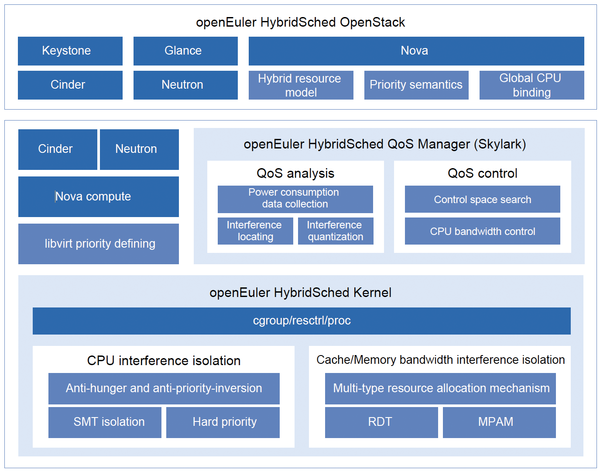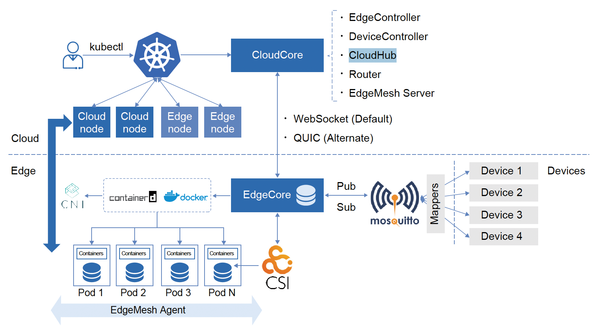Versatile Linux with eyes on the enterprise
Server
The server room setting has undergone significant changes in recent years, and openEuler comes with several technologies designed to add efficiency and improve TCO. One example is DPUDirect, a cross-host collaboration framework that allows services to migrate between hosts for better flexibility and failover in a server room environment. DPUDirect responds to the expanding use of Data Processing Units (DPUs). DPUs, which are frequently used in AI and other data-intensive operations, combine features of a CPU and network interface to offload network-intensive tasks, improving performance in settings where complex computations are shared among multiple processors. DPUDirect facilitates offloading of the container or virtualization management plane, eliminating redundancy and improving efficiency in DPU-based environments.
openEuler also supports Enhanced Network File System (eNFS), an advanced version of NFS designed for Network Attached Storage (NAS) environments, as well as HPCRunner, a tuning assistant that reduces deployment costs and improves optimization efficiency.
EulerFS is a file system designed to work efficiently with non-volatile dual in-line memory modules (NVDIMMs). Although other file systems, such as the EXT4 file system, can work with NVDIMMs, heavy metadata management overhead can reduce the overall performance. EulerFS employs pointer-based dual directory views to reduce metadata synchronization overhead.
Cloud
Cloud technology is increasingly important in the IT space. openEuler supports a number of components designed for delivering smoother and more efficient cloud operations. HybridSched is a full-stack solution for hybrid deployment of VMs, providing enhanced OpenStack cluster scheduling and kernel-mode basic resource isolation (Figure 4). Skylark, which is incorporated with HybridSched, is a Quality-of-Service (QoS) aware resource scheduler that improves utilization when high- and low-priority VMs are deployed together.

KubeOS is a lightweight operating system that supports containerization in cloud-native scenarios. You can manage your KubeOS environment through Kubernetes, including atomic upgrades and API-based operations for both containers and node OS components. open-Euler also supports Rubik, a hybrid container deployment engine that schedules and isolates resources to improve node resource utilization, ensuring prioritization for mission-critical services. NestOS is a cloud OS incubated in the openEuler community that offers secure management and integrates popular container engines such as Docker, Podman, and iSulad.
openEuler images are currently available directly within the AWS, Azure, and Alibaba cloud systems, and you can install openEuler as a community-provided image in the Google cloud.
Edge
Edge computing is an important topic for many organizations as the old paradigm of centralized processing gives way to exploding data volumes from self-driving cars, industrial sensors, IoT systems, and other smart devices. open-Euler responds to the edge challenge by integrating KubeEdge, an open source management and provisioning tool incubated by the Cloud Native Computing Foundation. openEuler Edge integrates KubeEdge into a unified management platform (Figure 5) that streamlines AI deployments, implements service discovery and traffic forwarding, and improves processing and efficiency for edge devices.

« Previous 1 2 3 4 Next »
Buy Linux Magazine
Subscribe to our Linux Newsletters
Find Linux and Open Source Jobs
Subscribe to our ADMIN Newsletters
Support Our Work
Linux Magazine content is made possible with support from readers like you. Please consider contributing when you’ve found an article to be beneficial.

News
-
The Next Linux Kernel Turns 7.0
Linus Torvalds has announced that after Linux kernel 6.19, we'll finally reach the 7.0 iteration stage.
-
Linux From Scratch Drops SysVinit Support
LFS will no longer support SysVinit.
-
LibreOffice 26.2 Now Available
With new features, improvements, and bug fixes, LibreOffice 26.2 delivers a modern, polished office suite without compromise.
-
Linux Kernel Project Releases Project Continuity Document
What happens to Linux when there's no Linus? It's a question many of us have asked over the years, and it seems it's also on the minds of the Linux kernel project.
-
Mecha Systems Introduces Linux Handheld
Mecha Systems has revealed its Mecha Comet, a new handheld computer powered by – you guessed it – Linux.
-
MX Linux 25.1 Features Dual Init System ISO
The latest release of MX Linux caters to lovers of two different init systems and even offers instructions on how to transition.
-
Photoshop on Linux?
A developer has patched Wine so that it'll run specific versions of Photoshop that depend on Adobe Creative Cloud.
-
Linux Mint 22.3 Now Available with New Tools
Linux Mint 22.3 has been released with a pair of new tools for system admins and some pretty cool new features.
-
New Linux Malware Targets Cloud-Based Linux Installations
VoidLink, a new Linux malware, should be of real concern because of its stealth and customization.
-
Say Goodbye to Middle-Mouse Paste
Both Gnome and Firefox have proposed getting rid of a long-time favorite Linux feature.
